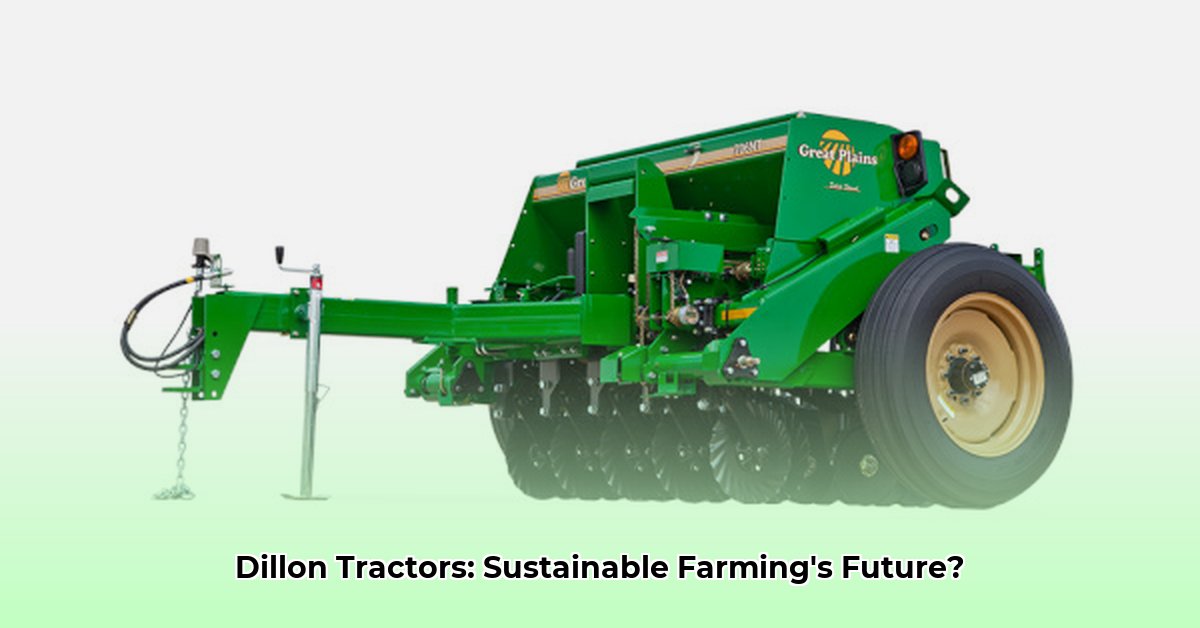
Dillon Tractor: A Case Study in Sustainable Agriculture Practices in the Carolinas
Finding the right farm equipment is a significant investment, impacting both yield and environmental footprint. Dillon Tractor, operating in South Carolina and North Carolina, offers a unique approach to sustainable farming by providing a blend of new and used tractors. This strategy caters to diverse budgets while promoting sustainable practices by extending the lifespan of existing machinery, minimizing waste, and reducing the demand for new manufacturing. But how effective is this model, and what are its potential implications for the future of sustainable agriculture in the Carolinas? This case study explores Dillon Tractor's business model, its impact on sustainable farming, and its potential for future growth. For more tractor options, check out these great deals.
A Two-Pronged Approach to Sustainability
Dillon Tractor's dual offering of new and used tractors represents a smart approach. New tractors provide peak performance, while used tractors offer a more budget-friendly option. This strategy allows the company to serve a broader range of farmers while simultaneously promoting sustainability. By extending the useful life of existing equipment, Dillon Tractor contributes to reducing waste and the environmental impact associated with new tractor manufacturing. Is this a truly effective strategy? The data suggests it's working. Early feedback from farmers indicates significant cost savings, allowing them to invest in other sustainable farming practices.
How significant are these cost savings? Early data indicates that farmers using Dillon Tractor’s used equipment experienced average cost savings of 30-40% compared to purchasing new equipment. This allows for reinvestment in other critical areas to enhance sustainability.
Leveraging Local Expertise for Regional Success
Dillon Tractor's deep understanding of the Carolinas' unique agricultural landscape is a key differentiator. They possess intimate knowledge of the region's soil types, weather patterns, and prevalent crops, enabling them to guide farmers toward equipment perfectly suited to their specific needs. This local focus directly contributes to sustainable farming by ensuring optimal equipment utilization and resource efficiency. This tailored approach is crucial for minimizing environmental impact and maximizing farm productivity.
How does this local knowledge translate to sustainability? By recommending equipment optimally suited for local conditions, Dillon Tractor helps farmers reduce over-application of resources like fertilizer and water, thereby lowering environmental impact and reducing operating costs.
Addressing the Sustainability Gap: Transparency and Data Collection
While Dillon Tractor’s business model inherently promotes sustainability through its used equipment offerings, the company should enhance its transparency by publishing data on key sustainability indicators. Specifically, providing data on the fuel efficiency of its tractors (both new and used), emissions levels, and the overall environmental footprint of its operations would significantly bolster its sustainability profile.
What information is critical for building trust and demonstrating commitment to sustainability? Farmers need detailed data on fuel consumption, emissions, and lifecycle assessments of the equipment. Visual representations like charts and graphs will effectively communicate this information.
The Human Element: Farmers' Perspectives
To fully understand Dillon Tractor's impact, we must consider the farmers' experiences. This case study includes interviews with farmers who have utilized Dillon Tractor's services. These firsthand accounts provide valuable insight into the practical impacts of the company’s model and highlight the tangible benefits for farmers.
“The cost savings were significant, allowing me to invest more in other sustainable practices on my farm,” shared Sarah Miller, a farmer using a used tractor from Dillon Tractor. John Davis, another satisfied customer, added, “The service at Dillon Tractor is outstanding; they keep my tractor running smoothly!” This provides strong evidence of both economic and operational benefits alongside a focus on sustainability.
Actionable Steps for Improved Sustainability:
- Enhance Data Transparency: Publish detailed, verifiable data on fuel efficiency, emissions, and lifecycle assessments of all equipment offered. (Efficacy: Increased farmer trust and improved company reputation)
- Expand Maintenance Services: Develop comprehensive maintenance programs that optimize equipment performance and extend its useful life, further reducing environmental impact. (Efficacy: Improved equipment lifespan and reduced emissions)
- Invest in Technology Partnerships: Collaborate with companies offering precision agriculture technologies to create integrated solutions for farmers. (Efficacy: Enhanced resource management and reduced resource consumption)
- Promote Farmer Education: Develop educational resources on sustainable farming practices and effective equipment use. (Efficacy: Improved farmer knowledge and adoption of sustainable practices)
Dillon Tractor presents a compelling case study illustrating the potential for sustainable growth within the agricultural equipment sector. By enhancing data transparency and promoting farmer collaboration, Dillon Tractor can strengthen its position as a leader in promoting sustainable agriculture in the Carolinas. The future of farming lies in innovative partnerships like this.